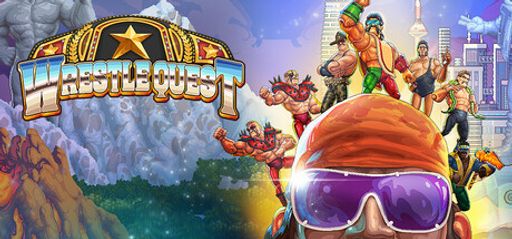I dove into WrestleQuest with high expectations and a keen eye for detail. As a professional gamer and dedicated critic, I value intricate gameplay and deep strategy. WrestleQuest aims to blend pro wrestling nostalgia with old-school RPG mechanics in a pixel art fantasy. I found that the game boldly combines mixed genres. It offers humor, intensity, and surprising depths. Yet, much like an undercard match, a few missteps left a bruised feeling. Overall, WrestleQuest screams potential yet stumbles in a few critical areas.
Overall Impression
At first glance, WrestleQuest wraps its player in a world of over-the-top wrestling iconography and fantastical lore. Mega Cat Studios took a risk by meshing wrestling culture with a fantasy RPG. Guiding figures like “Macho Man” Randy lend the game an undeniable charm. I appreciated the retro pixel graphics and the vibrant character designs that evoke a sense of nostalgia. The game is unafraid to be audacious and quirky. It stands out from the typical RPG crowd with its unique theme and irreverent humor. However, these bold creative choices sometimes go past the simple expectations of what a solid RPG should deliver.
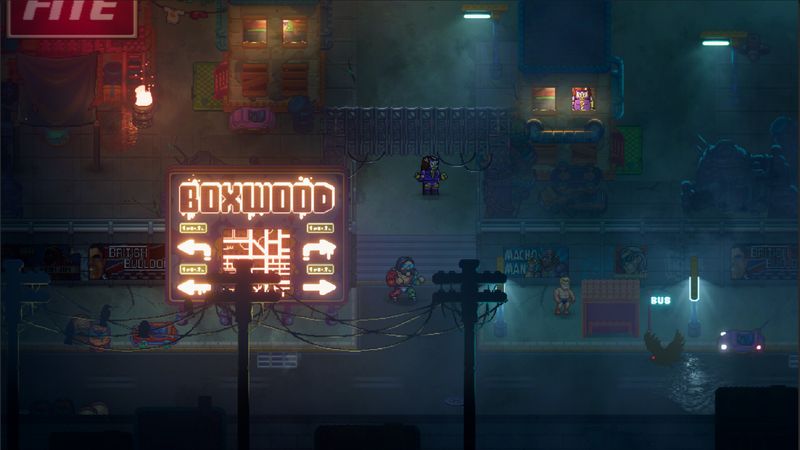
Gameplay Mechanics
Delving into the gameplay mechanics, I found that WrestleQuest offers a mixed bag of brilliance and rough edges. On the positive side, the combat system delivers a satisfying variety of moves that capture the excitement of wrestling. I admired the diversity of combat moves and the adrenaline rush that came with each powerbomb and suplex. There is genuine charm in experimenting with different character abilities. This is a title that rewards creativity and risk-taking in battles against a range of quirky enemies.
Yet the combat is not without its flaws. Several players have noted that the system lacks clarity. There are no clear indicators or damage numbers to compute the consequence of each move. This omission leaves less room for strategic planning during fights. I felt that each encounter could have benefitted from streamlined combat indicators. The absence of visible damage stats means players must rely on instinct and trial-and-error. Additionally, the elemental bonuses and stat boosts remain under-explained. I found myself guessing the utility of one move over another. Addressing this shortfall would strengthen the game’s appeal for hardcore gamers like myself.
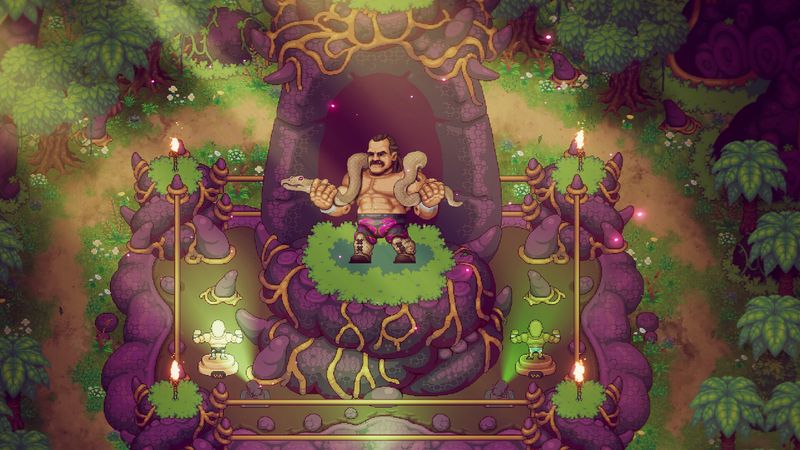
Story and Characters
Character development and storytelling are other focal points of the game. WrestleQuest offers a campy but earnest narrative steeped in over-the-top theatrics. The storyline is as colorful and extravagant as a wrestling promo. Characters such as Vanetta and Loachador stand out, not only for their design but also for their unique arcs. I found that Loachador’s quest alone was a highlight. His narrative pays tribute to wrestling legends while exploring personal growth and sacrifice. The narrative is peppered with humorous nods and action figure jokes that drive home the old-school wrestling vibe. I must admit that these narrative beats resonated with my expectations for an RPG crossover.
Conversely, the main story’s conclusion left me wanting more. The final quest hints at player choice yet delivers a linear outcome. I felt that the supposed climax was more of a predetermined scripted event. The epilogue, though filled with delightful character callbacks, did not provide a final punch worthy of a hardcore fan’s investment. In the end, the decision-making moments are sacrificed for theatrics. While this may suit casual play, it does leave competitive gamers like myself craving a deeper impact from our choices.
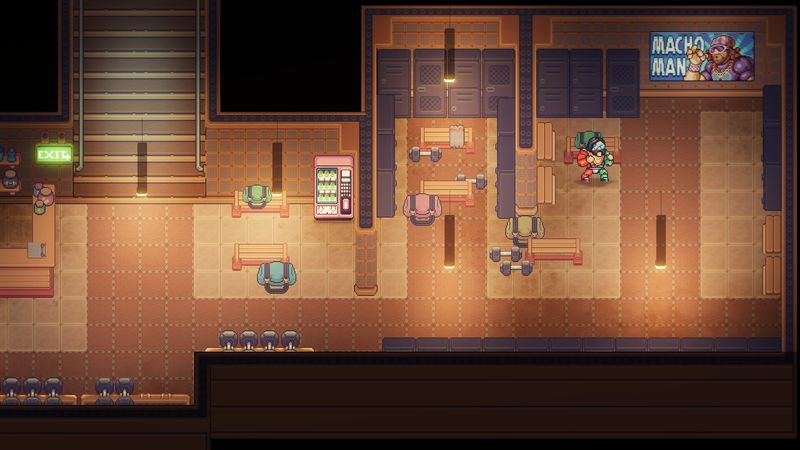
Visuals and Graphics
Visuals and graphics merit appreciation in WrestleQuest. The pixel art style is deliberately nostalgic and dignified. Every environment—from the castle maps to the diverse biomes—exudes a charm that feels both retro and fresh. I admired the way the developers embraced the format. The game’s aesthetic consistency builds an immersive world, even if some design choices (like the minimap interface) feel poorly optimized. The minimap requires interaction with undetailed billboards and does not update consistently. This oversight can hinder navigation, particularly in areas with repetitive visual cues such as jungle or military biomes. Nonetheless, the overall art design creates a dynamic stage that is fun to explore.
Sound and Music
Sound and music play crucial roles in shaping the game’s atmosphere. WrestleQuest boasts an incredible soundtrack that complements the intensity of each match perfectly. The music drives the adrenaline and matches the high stakes of the wrestling narrative. Sound effects during chaotic battles further enhance the feel of wearing down an opponent. On the other hand, the voice acting leaves room for improvement. I noticed that character voices often default to catchphrases rather than full dialogue. This limitation distracts from an otherwise engaging vocal performance. A more robust voice acting approach could elevate the dramatic moments and enrich player immersion.
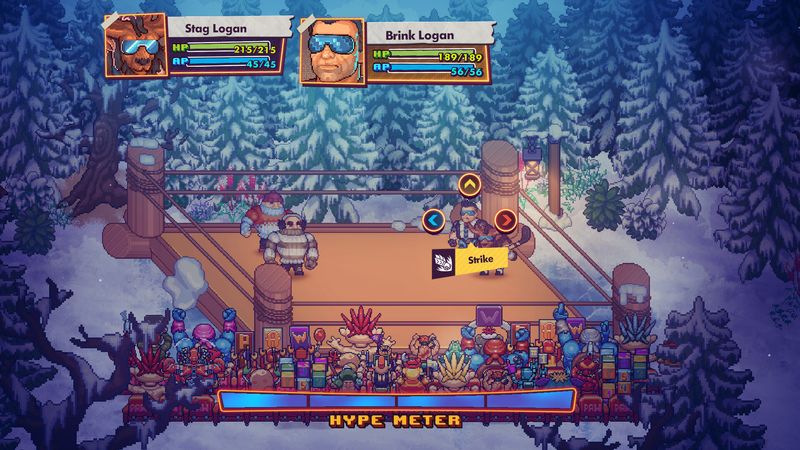
Difficulty and Replayability
Important markers of WrestleQuest’s design. The game positions itself as accessible yet challenging, but there is a gap in the current balance. The combat, while fun, feels overly forgiving during standard play. I was aware of suggestions from the community for a higher difficulty mode. Increasing the challenge would not only test advanced players but also provide medical counters for the blunders during battles. There are hints in dialogue and abilities that certain enemies possess unique strengths or weaknesses. However, such critical details are not always conveyed clearly. An in-depth guide or accessible stats would be very helpful for refining tactical play.
Quality of life improvements have been noted in recent patches, and I appreciate the developers’ responsiveness. Bugs, such as the one affecting Muchacho man’s sailor arm weapon, briefly marred my experience. I understand that Devs at Mega Cat Studios responded swiftly by releasing a patch that fixed these issues. While technical hiccups do occur, the prompt developer response reassures me that the game’s full potential will be realized over time. I also see merit in proposed requests such as a mission replay function, a refined minimap, and an in-game fast-travel option. These would streamline gameplay and improve overall engagement, especially during hour-long play sessions where navigation can become a chore.
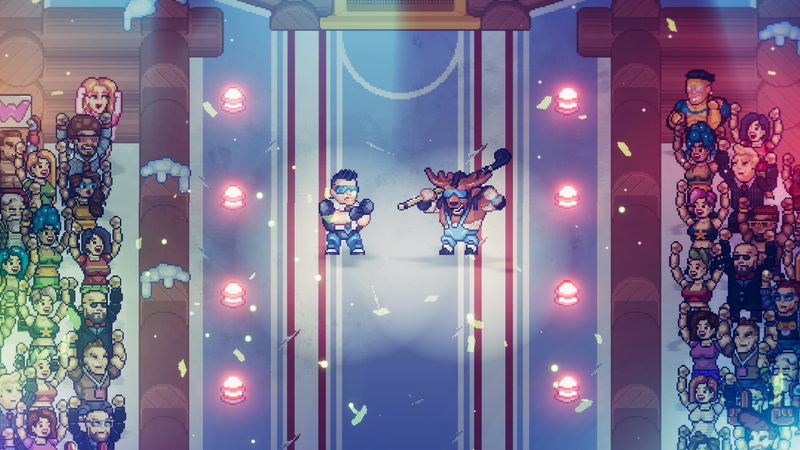
Final Thoughts
In comparing WrestleQuest to other genre titles, I find that it occupies a unique niche. The game meshes elements of pro wrestling with RPG fantasy in a way that few other titles dare to try. Its blend of humor, hardcore combat, and nostalgic flair sets it apart. Despite its rough patches, I view it as a promising title that rewards those willing to embrace its quirks. I have always gravitated toward games that offer strategic depth and clear talent development. Although WrestleQuest sometimes leaves details obscured, its spirit and ambition are unmistakable.
Conclusion
In conclusion, WrestleQuest is a bold experiment that successfully captures the irreverent spirit of pro wrestling and the excitement of classic RPGs. It offers moments of brilliance from its varied combat system and immersive pixel art worlds. However, it falls short in areas like combat clarity and narrative impact during crucial story arcs. As PlayerProX, I appreciate the game’s ambition and applaud its efforts. The improvements implemented by Mega Cat Studios demonstrate a willingness to listen to player feedback—a quality I value highly in modern games.
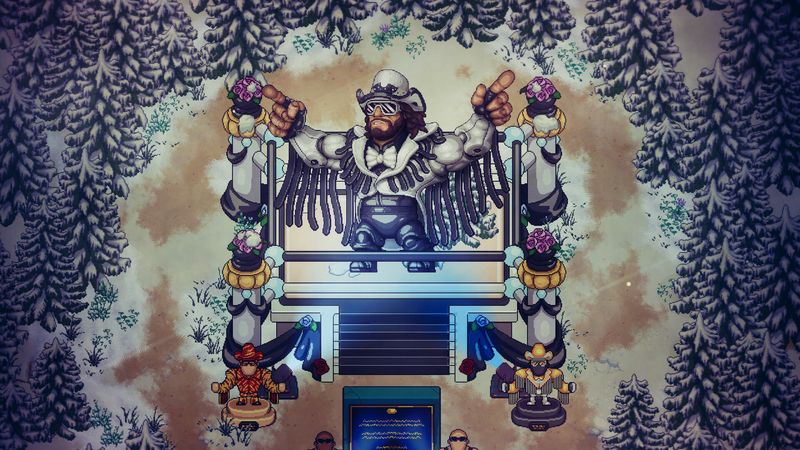
I rate WrestleQuest 4 out of 5 stars. It is not flawless, but its originality and evolving design make it a must-play for those who appreciate both the drama of the wrestling ring and the strategy of RPG mechanics. WrestleQuest might just be the tag team partner you never expected.

